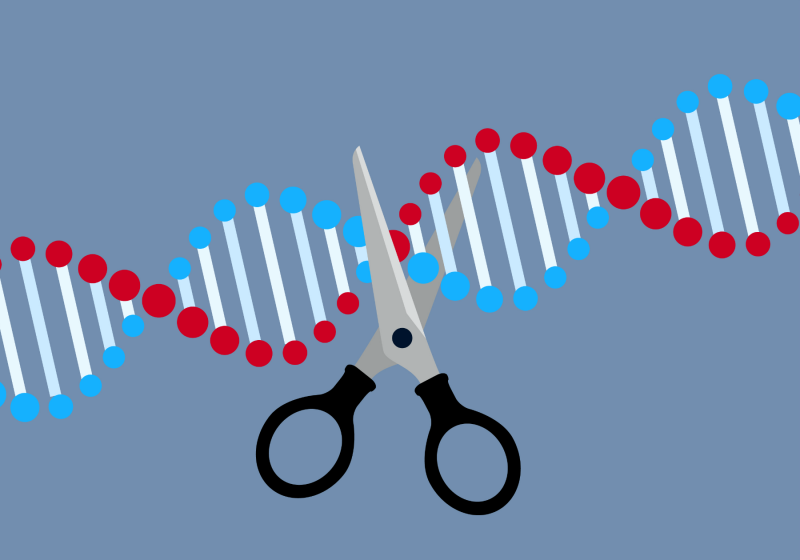Imagine a world with no disease, where we can alter our genes to become the best version of ourselves. Maybe you want to be the most fit, have great health , or be the smartest. But at what cost are we willing to get to this?
Recently I watched the documentary Unnatural Selection on Netflix, which delved into the world of genetic editing, and touched on some of the dangers that may arise because of it. One particular issue it focused on what biohacking, which is when people use aspects of biology to change their body in some way. CRISPR, a new genetic editing technology, would allow people to do this easily at home. However, by making changes to the ones genetics, they are altering the the genetics of their offspring, which could possibly have detrimental effects in the future.

So, what is CRISPR?
CRISPR is one of the most versatile gene editing methods, so simple it is often described as cutting and pasting our genes. CRISPR stands for Clustered Regularly Interspaced Short Palindromic Repeats. Essentially it works by removing a portion of a gene, and letting natural DNA repair systems take over.
Hundreds of studies are currently happening, in terms of how the technology can be used therapeutically, to treat a wide range of diseases, from HIV, blindness, and sickle cell anaemia.
Markus Mapara, MD, from Columbia University, used the CRISPR technology on a patient with sickle cell anaemia, a blood disorder. It is estimated that the disease affects 1 in every 2000 people in the UK, making it one most common genetic disorders in the UK. The genetic mutation causes the body to make an abnormal form of haemoglobin – a protein essential for red blood cells to deliver oxygen around the body. Currently the standard treatment is a bone marrow transplant, however this introduces the risk of infection and rejection. CRISPR is a new promising treatment that may be able to change the outcome for these patients.
So what’s the problem?
In a technology with such promising outcomes, it is hard to imagine why it may be a problem. But for ethicists, it has raised huge concern.
As I mentioned at the start, one of the main concerns brung up in the documentary was biohacking. The documentary goes into the story of Josiah Zayner, a formed NASA scientist. He injected himself with this technology, to grow his muscles. He stated that his motivation was to prove that CRISPR worked, and show the possibilities of gene editing. He believes that people should be able to get involved in science at home, and it shouldn’t just be down to scientists in labs. In addition to trying to grow his muscles, he also performed a full microbiome on himself, including a faecal transplant. The documentary Gut Hack goes into further detail of this, and the outcomes.
To most of us, this seems terrifying – injecting ourselves to permanently change our genes, without knowing the outcome. So why do biohackers do it? They all have different motivations, however the is a general consensus that they are frustrated with the slow progress and tight regulations around these technologies. They believe that they should be more accessible.
This moves onto another problem with the technology – accessibility. A problem that strikes those working on these technologies, is whether the people that need it, will be able to access it. The costs of the technology may be a barrier for those wanting the technology to cure disease. Rather those with money may be using it for enhancement purposes – to make them faster, be able to concentrate longer, be fitter, be smarter etc. However, this will only create a larger divide in society.
This leads of onto the issue of eugenics. Ethicists have concerns that IVF clinics may be able to access this technology, and use it to alter embryos. This was done by a Chinese scientist Jiankui He, who genetically altered the DNA of three embyros, who then developed into babies, including two twins. He was aiming to make the children immune to HIV, however this was deemed irresponsible and he was jailed for 3 years. (https://www.theguardian.com/science/2023/mar/06/forthcoming-genetic-therapies-serious-ethical-questions-experts)
So what’s the outcome?
The topic is very much up for debate within the science, political and ethical world, however I am going to conclude my current thoughts on the technology.
Looking from a utilitarian point of view, I am inclined to believe that the benefits of the technology will one day be more beneficial than the risks. However, I think a lot more regulations need to be put in place before this can happen.
The problem with making it easily accessible is biohackers, however with a lack of accessibility we create a societal divide and lean towards the world of eugenics. My idealist view would be to make it accessible through health care, and not make it a technology that is readily available to the public, however as the documentary Unnatural Selection discusses, this is a very idealist view.
Here is a short video clip of the documentary:
Amazing read! I will definitely be checking this documentary out 🙂
A well-written fascinating blog with clear understanding of the topic and good, clear communication. The ethics could be explored more. You have discussed elitism and accessibility but there is definitely scope for a critical debate about misuse, be it with good or bad intentions (e.g who gets to decide when it is acceptable or not). Where the opportunity arises, try to thread your opinion throughout to make it more reflective.